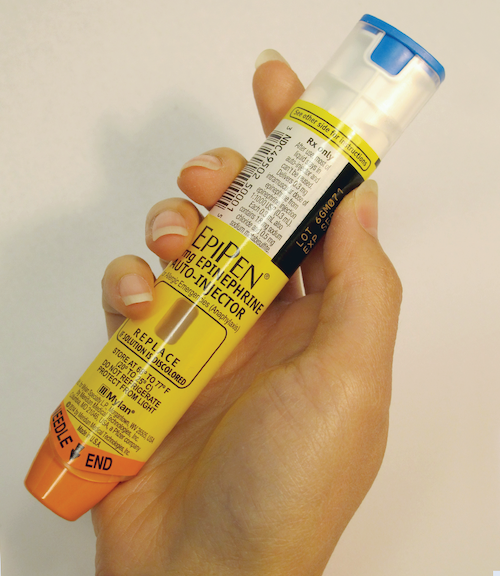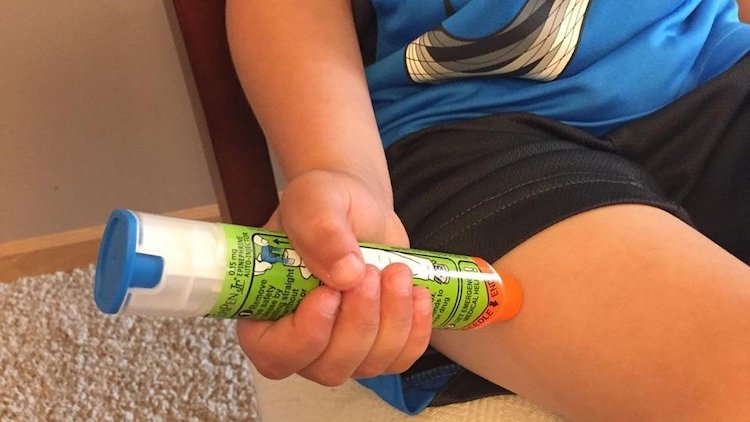Reasons For A
Swollen Tongue
One of the most common reasons for a swollen tongue is an allergic reaction to something. And the FASTER the swelling comes up, the more serious the allergy.
If it swells up within minutes or less than an hour, it is potentially life-threatening.
Head to the nearest hospital emergency department. This can be VERY SERIOUS. Please don't delay. If your tongue has started swelling, and has increased in size rapidly, just get yourself to the Emergency Room.
But an enlarged tongue that has developed over a longer period of time (a day or longer) is less likely to have a serious cause.
Reasons For A
Swollen Tongue
The most serious allergic reaction which can cause a rapid tongue swelling is called anaphylaxis, or anaphylactic shock.
There are a number of symptoms that point towards a possible anaphylactic reaction. These are so important that I'm going to list them right here. Please read this very carefully. The symptoms of anaphylactic shock may include (but NOT be limited to) :
- A blue coloration to the lips, earlobes or fingernails.
- Becoming unresponsive or passing out (ie. fainting).
- Coughing up blood.
- Difficulty swallowing.
- A tight feeling in the throat.
- General swelling or puffiness around the eyes and lips.
- The person may become very distressed.
- Nausea or vomiting.
- Breathing problems, being short of breath or difficulty with breathing.
What allergies can result in anaphylaxis?
Almost any type of allergy can lead to anaphylaxis, if the person is sensitive enough to the thing that causes the allergy. Here are the most common reasons for a swollen tongue due to an allergy;
- Insect bites or snake bite
- A drug allergy, such as penicillin or codeine
- A food allergy such as nuts, seafood or certain fruits
Most people are familiar with food allergies such as peanut allergies. Although these can be serious, it's not very common to get a full-blown anaphylactic reaction from a food allergy. It CAN happen, but it's RARE. However, a rapidly enlarged tongue can still occur, and be quite frightening.
The danger here is that a swollen tongue may block the airway. The quickest treatment is a small dose of adrenalin - usually by injection. There is a great little auto-injector device called an Epi Pen.

How does the EpiPen device work?
As you can see in the images, it's quite big, which means it's easy to hold when you're stressed. The orange end is the working tip. You have to pull off the cap at the other end, then hold the EpiPen firmly in your hand as shown, and then push it hard against your thigh, and hold it there for a few seconds. The auto-injector does the rest!
The small dose of adrenalin should help to reduce the effects of an allergic reaction, including a swollen tongue. If there is no improvement in a few minutes, use a second EpiPen dose.

A rapid tongue swelling from an allergy is most likely to be caused by an allergy to something other than food, most likely a particular medicine, or from an insect bite or snake bite.
In fact, allergies to medicines of one sort or another are probably the commonest cause. In dentistry, a surprising number of my patients have an allergy to latex, which means that I have to switch to latex-free gloves.
There are also many other reasons for a swollen tongue or an enlarged tongue. These are generally less rapid to develop.
Other Reasons For A
Swollen Tongue
Tongue swelling can occur with:
1. Acromegaly. This is a hormonal disorder that results in enlarged skull, hands and feet, as well as causing other complications. The enlarged tongue develops gradually over a long period of time.
2. Amyloidosis. An enlarged tongue is a typical symptom of this serious disorder, but it is the least of the problems involved. A diagnosis of amyloidosis is made by biopsy, not by having an enlarged tongue.
3. Beckwith-Wiedemann Syndrome. A very rare condition. Symptoms may include one side or area of the body growing more than the other side (asymmetric growth or hemihyperplasia), low blood sugar (hypoglycemia) in infancy, an abnormally large tongue (macroglossia), abnormally large abdominal organs, creases or pits in the skin near the ears, and kidney abnormalities.
Affected children have an increased risk to develop tumors, particularly a rare form of kidney cancer called Wilms tumor, a cancer of muscle tissue called rhabdomyosarcoma, and a form of liver cancer called hepatoblastoma.
4. Downs syndrome. Sufferers typically have a larger than normal tongue. This is not significant at all. The tongue may also gradually become wider in persons who have no natural teeth and do not wear dentures.
5. Hereditary Angioedema. This is an extremely rare genetic condition that can cause periodic swelliing of the tongue and pharynx, as well as other parts of the body.
6. Trauma - biting the tongue while eating, or in an accident like a car smash. This is like accidentally hitting your thumb with a hammer - some of the swelling is due to inflammation, and some of the swelling is from ruptured blood vessels, causing a severe bruise or haemangioma.
Other causes of trauma include a burn from scalding food or drink, or injury from a dental device.
7. Burning Tongue Syndrome. Some people who suffer from burning tongue syndrome also feel that they have an enlarged tongue.
8. Cancer of the tongue. Usually there is no tongue swelling in the early stages of tongue cancer, so DO NOT allow a LACK of swelling to convince you that there's nothing wrong. Check out cancer of the tongue for things to watch out for.
9. Infection. This isn't very common as a genuine cause of an enlarged tongue. It's usually a case of the tongue being so uncomfortable that it feels enlarged. It may well be slightly swollen, but only slightly. It feels much worse than it actually is.
The most common infections are;
- Herpes virus
- A streptococcal sore throat
- A yeast infection
You can read more about this at my page on tongue infections.
8. Leukemia. A swollen tongue is only one of the symptoms of leukaemia, and it doesn't always occur. Like with amyloidosis, it's the least of your worries.
9. Vitamin B deficiencies. You can get a tongue swelling when you have a vitamin deficiency, such as B3 or B12. This can be caused by a poor diet, or a digestive problem. As well as a moderately enlarged tongue, most sufferers are also plagued by mouth and tongue ulcers.
There are also other, rarer, causes of tongue swelling. The general rule is always the same; if you notice something in your mouth is different or has changed over the last days or weeks, get it checked by a healthcare professional.
Most things are harmless, and EASILY TREATED; but the important thing is to catch the serious conditions as early as possible.



